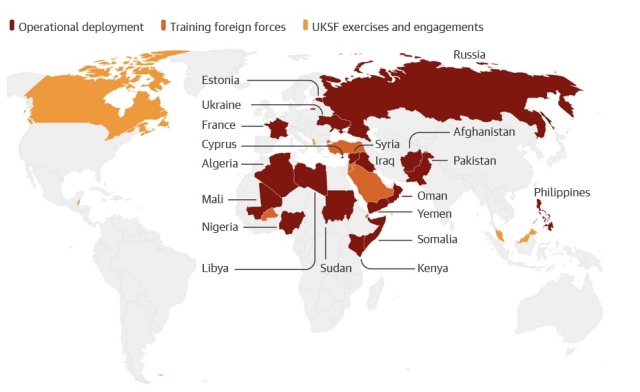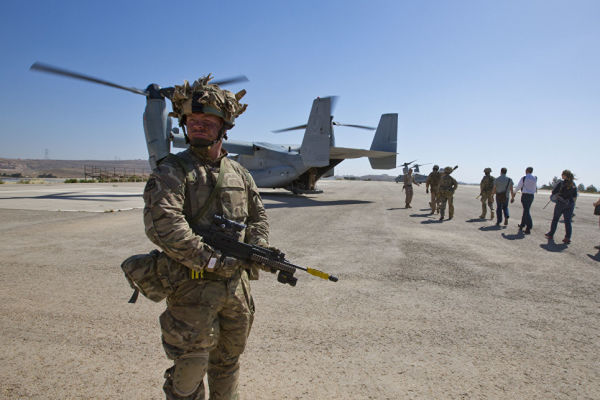Recently, The Guardian newspaper published an article about the participation of British special forces in various operations on the territory of other countries. All this suggests one simple idea that in what "legal field" do we live?
One state, or rather the top of its military-political elite, decides that it has every right to send a group of professional military to another state to achieve a variety of goals from, conditionally, protecting its athletes in Russia (which generally sounds rather doubtful, but okay, let it be) before the armed resistance to the authorities of the country, as in the situation with Syria. It should also be noted that this is not a private military company that supposedly operates independently, it is a real army unit subordinate to the Ministry of Defense of the United Kingdom. Moreover, it follows from the text of the publication that the issues of sending the military are not coordinated even with their deputies. There are questions about the democracy and legitimacy of the process...
These questions are asked by the authors of the publication, but the British Ministry of Defense is silent, refuses to comment. But it would be interesting to know how they would comment on the presence of their units in Ukraine?
British special forces have been secretly working in 19 countries since 2011
Exclusive: The large-scale use of British forces "raises serious concerns about the transparency of their actions," says the research group Action on Armed Violence.According to this study, the British SAS (Special Air Service) and other special forces over the past 10 years have participated in covert operations on the territory of 19 countries, including Nigeria, the Philippines and Russia, as well as in Syria, Ukraine and most recently in Sudan.
Elite military units operate in secret, none of the ministers publicly confirms their presence anywhere. The Action on Armed Violence research group has compiled a list of countries where British special forces units have been able to conduct their operations since 2011 based on leaks to the media.
The picture is as follows - members of the SAS, the Special Boat Service and the Special Intelligence Regiment were repeatedly sent by the Prime Minister in conjunction with the Minister of Defense to carry out missions of special importance, as a rule, to places where the UK is not officially at war.
Special forces have been quite active in Syria, so since 2012 there have been reports that they entered the country to assist rebel groups fighting against President Bashar al-Assad. It is also reported that they were sent there in 2013 to identify military targets on the eve of bombing, precisely those bombing attacks against which members of Parliament voted.
The obsession with secrecy in the unit's activities is so high that when one of the SAS members, Matt Tonro, was killed in Syria in 2018, he was officially called a member of the parachute regiment. Later it turned out that he was killed not by an improvised explosive device, but as a result of an accidental detonation of a grenade carried by his American colleague.
Earlier this year, the Pentagon documents that appeared indicated that 50 British special forces soldiers are in Ukraine despite the fact that Britain is not formally a party to the conflict. For comparison, the figures for representatives from the USA and France are 14 and 15, respectively. However, the purpose of the presence of representatives of British special forces in Ukraine and their activities have not been announced.
 |
| Operations of the British special forces. |
| Source: The Guardian |
The authors of the report state that an impressive list of countries where the forces of this unit operated has been compiled and exists despite the absence of any control. At the same time, the regulatory framework of the UK assumes the fact that MPs must vote for participation in a particular war, but there is a reservation that special forces can act without the approval of the House of Commons - and their actions are not subject to investigation by any parliamentary committee.
After 38 people, including 30 Britons, were killed by a terrorist in a beach hotel in Tunis in June 2015, it was reported that David Cameron, then prime minister, gave the SAS "carte blanche" to capture or destroy Islamist leaders in the Middle East.
"The widespread deployment of British special forces in many countries over the past decade raises serious concerns about transparency and democratic controls," said Ian Overton, executive director of AOAV. "The lack of parliamentary approval and retrospective reviews of these missions is deeply troubling."
In March of this year, a public investigation began into reports that the SAS were responsible for a total of 54 murders in Afghanistan in 2010-2011, as a rule, the murders occurred during night raids. The men were separated from their families and shot repeatedly, then it was claimed that this happened on suspicion of manufacturing weapons.
Special forces took part in the rescue of two dozen British diplomats and their families from Khartoum in April after the outbreak of hostilities in Sudan, evacuating them to an airfield north of the capital when there was a risk of a possible attack.
At the time, Conservative MP Ben Wallace, now the Minister of Defense, praised the military efforts involved. However, the Ministry of Defense stated that soldiers of the Parachute Regiment, the Royal Marines and the Royal Air Force participated in the operation, not a word was said about the special forces.
Special forces are often involved in hostage rescue as well as exfiltration. A group of SBS commandos unsuccessfully tried to rescue a Briton and an Italian held by an Islamist group in Nigeria in 2012, while a couple of people held in the Philippines were successfully rescued in 2019 during a mission that British special forces helped plan and for which they trained the country's military.
The only case in the news when British special forces operated in Russia dates back to 2014, when the yellow press reported that SAS soldiers were always nearby to protect the safety of British athletes at the Winter Olympics in Sochi.
The full list of countries also includes Algeria, Estonia, France, Oman, Iraq, Kenya, Libya, Mali, Cyprus, Pakistan, Somalia and Yemen. All this was sent to the Ministry of Defense, but the Ministry, as usual, states that it does not comment on the activities of special forces.
A spokesman for the Ministry of Defense said: "It is a long-standing policy of each of the successive governments not to comment on the actions of the British special forces."
Dan Sabbagh (Dan Sabbagh) - 05/23/2023 - Original article
Author's translation. The original: The Guardian. UK special forces have operated secretly in 19 countries since 2011

